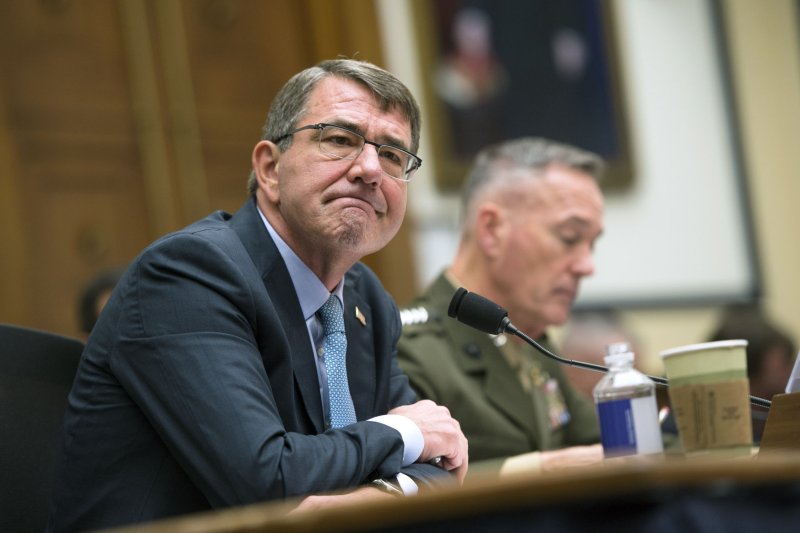Secretary of Defense Ashton Carter (L) and Chairman of the Joint Chiefs of Staff General Joseph F. Dunford, Jr., USMC, testify during a House Armed Services Committee hearing on the U.S. Strategy for Syria and Iraq and its implications for the region, on Capitol Hill in Washington, D.C. on December 1, 2015. Photo by Kevin Dietsch/UPI. |
License Photo
WASHINGTON, Jan. 11 (UPI) -- U.S. Secretary of Defense Ashton Carter said the United States could maintain a presence in Iraq after the Islamic State is defeated in the battle for Mosul.
Speaking from the Pentagon during a press briefing, Carter said the Islamic State, also known as ISIS, Daesh and ISIL, could remain a threat to Iraqi and regional security even after it is removed from power in Iraq's second-largest city and the militant Islamist group's stronghold in Iraq: Mosul.
Carter said the decision to keep a residual U.S. military presence in Iraq would be up to the Iraqi government and Prime Minister Haider al-Abadi.
The United States leads an international coalition against the Islamic State that carries out airstrikes, trains Iraqi forces and gathers intelligence, while the Iraqi government, Shiite-led militias and the Kurdish Peshmerga engage the Sunni Islam militant group in ground offensives.
"It'll take some time to consolidate Iraqi security, even after the fall of Mosul, which will occur like the defeat of ISIL will occur. But there will be other cities and towns lesser in Iraq ... where the government's control will need to be secured and reconstruction and stabilization will begin -- need to begin," Carter said. "There will be an ISIL tendency to go underground and to go to more isolated regions and continue to try to mount counter-terrorist operations, and that'll require a sustained effort. And I think the United States and the other -- and the international coalition, everybody's realistic about that."
Joint Chiefs Chairman Gen. Joseph Dunford said the issue of keeping a U.S. military "long-term presence in Iraq" is "obviously a question I'm gonna have to make a recommendation to the future administration."















